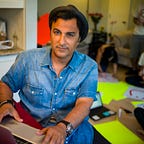Children sleeping in the mud
Joseph Shaba is back home in Sweden. We are sitting in my office, I have bought us breakfast. He can’t eat, there is so much he wants to tell me. I force him to eat at least half of his tuna sandwich.
He has been in Sweden not even 24 hours when I get the opportunity to meet him. His eyes are red, his shoulders down, this 31 year-old man came back Sunday morning full of anger and sadness.
Why did he go to Erbil? Where did he get the idea from?
“I felt that I needed to do something concrete, I was following the news both via media but also in contact with my relatives who live in Erbil. I want my nation to be safe, I want them to have the possibility to live free and make their own choices. So I was thinking of how to help them the best I can. I called a film-maker and told him I was going and he was very interested. I thought that, with a documentary film, I could make our plight known and maybe politicians would make a change after seeing it.”
Joseph Shaba was born in Ankawa, a suburb of Erbil. His family fled from Iraq in 1990. He still speaks both Assyrian and Arabic and knows his way around the Middle Eastern culture. Since the fall of Saddam, Joseph has been to Erbil several times, the last time was 2012. Now it’s a totally different situation. Hundreds of thousands have been forced to flee IS genocide against ethno-religious minorities in north Iraq and many in Ankawa are scared that IS will be able to invade KRG areas, too. They sleep with fear in their hearts and they wake up with fear.
He landed in Erbil at 8 AM on the 12th of October, a week ago. The first day he was touching base, he had a meeting with Delon Lourance, the cameraman that he hired and they were making plans. But just two days later, all their plans were worth nothing. Rain came to the KRG part of Iraq. Heavy rain. The strong winds blew the tents away, the ground turn into mud, and chaos arose in all the refugee camps.
Joseph takes a bite of his sandwich, a sip of his coffee, and he is silent for a minute, thinks, sheds a tear and starts to tell his story. This Swedish-Assyrian engineer that went to Iraq to interview some of the 600, 000 IDPs never expected what he was going to experience.
“Now the refugees were double or triple persecuted, the new atrocity came from nature itself … “
He stops talking for a moment, catches his breath and continues.
“The storm came at 8 o’clock in the evening. I was at my aunt’s house when I heard it pattering against the windows. My thoughts went directly to the children in the tents. When I was a child we lived in a refugee camp in Turkey ourselves, my family was another refugee family and it was raining in to the tent, so I know the feeling.”
He is anxious to tell the world about the horrifying circumstances these refugees are living under. He says that the rain in Turkey 14 years ago was not even close to the one in Erbil a week ago.
“I did not know what to do, I felt great frustration. I wanted to go to the refugee camps to film, I got no one to drive me until the morning. It was worse than I thought. Clothing and all other belongings were drenched in mud. Children slept directly on mud. It was a mess. I really felt for the parents. Imagine seeing your child muddy, frozen, and not being able to help. They were even unable to walk, they got stuck and fell. Children and elderly could not go to the toilet but had to do relieve themselves in their place.”
When IS invaded Mosul and the Nineveh Plains, all inhabitants had to leave with nothing other than the clothes on their backs. Not a penny to rent an apartment with, or even buy a loaf of bread. So they had nothing at all, they were living in tents and then the rain to took, even, that “roof” from over their heads. Many of them have caught diseases. Others, for example disabled, just wanted to die, nothing else. They want their lives to end.
Joseph has to leave, he is late to another meeting, he is determined to help the refugees and has booked several meetings to create awareness.
